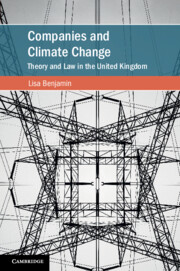Book contents
- Companies and Climate Change
- Cambridge Studies on Environment, Energy and Natural Resources Governance
- Companies and Climate Change
- Copyright page
- Dedication
- Contents
- Acknowledgements
- 1 Introduction
- 2 Theorising the Company in the Context of Climate Change
- 3 English Company Law and Climate Change
- 4 International and Transnational Climate Change Law and Policies
- 5 Domestic Climate and Energy Regulation
- 6 Companies, Human Rights and Climate Litigation
- 7 Fiscal Barriers and Incentives to Corporate Climate Action
- 8 Conclusion
- Index
2 - Theorising the Company in the Context of Climate Change
Published online by Cambridge University Press: 09 April 2021
- Companies and Climate Change
- Cambridge Studies on Environment, Energy and Natural Resources Governance
- Companies and Climate Change
- Copyright page
- Dedication
- Contents
- Acknowledgements
- 1 Introduction
- 2 Theorising the Company in the Context of Climate Change
- 3 English Company Law and Climate Change
- 4 International and Transnational Climate Change Law and Policies
- 5 Domestic Climate and Energy Regulation
- 6 Companies, Human Rights and Climate Litigation
- 7 Fiscal Barriers and Incentives to Corporate Climate Action
- 8 Conclusion
- Index
Summary
Chapter 2 assesses dominant corporate theories and norms such as shareholder primacy and shareholder wealth maximisation through the lens of climate change. It describes the ascent to dominance of these theories through the historical diversification of shareholder ownership and issue of agency costs. It highlights the three major negative contributions these theories have made to the issue of climate change: the elevation of the interests of shareholders to the detriment of non-shareholders, the fostering on a short-term approach to profit-making and finally the externalization of greenhouse gas emissions. The chapter then assesses competing theories of the corporate form which focus on stakeholder interests and the company as an entity, and how these theories provide a more holistic and appropriate model of the company in the context of climate change. The chapter concludes with the UK enlightened shareholder value approach and the US shareholder-centric approach to company law. While the United States has a more entrenched version of these dominant corporate theories such as shareholder wealth maximisation, even in this jurisdiction recent developments such as the Business Roundtable statement in 2019 illustrate discursive movements away from a shareholder-centric approach in the business world.
Keywords
- Type
- Chapter
- Information
- Companies and Climate ChangeTheory and Law in the United Kingdom, pp. 20 - 45Publisher: Cambridge University PressPrint publication year: 2021

